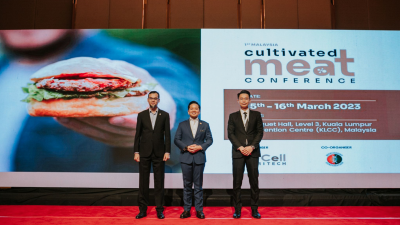Bio boost: Why bio-manufacturing crucial to building lasting eco-friendly food supply in APAC – Tidetron Bioworks

Tidetron was the winner of the Fastest Growing Agrifood Biotech Startup in China award at the recent Future Food Asia (FFA) event in Singapore, based on its wide-ranging portfolio produced via its in-house bio-fermentation technology.
As of June 2023, examples of items made using the firm’s products such as erythritol sweetener and gellan gum include coconut milk, coffee lattes, fruit juices, herbal teas and a variety of alcoholic drinks such as fruit wines.
“Of note for Tidetron is the use of our Tidetron Altra platform as the driving force behind the targeted production of desired materials or chemicals,” Tidetron CEO and Founder Zhang Zhiqian told FoodNavigator-Asia after the recent Food and Beverage Innovation Forum (FBIF) in China.
“This empowers us to provide sustainable alternatives to petroleum-based ingredients, thereby minimising environmental impact and reducing reliance on non-renewable resources – [This in turn] is very important when it comes to meeting the needs of food and beverage manufacturers in Asia, as there is increasing interest in driving a sustainable bio-based economy here.
“This is evidenced by growing stakeholder investment in areas such as synthetic biology research and development, as well as industrial policy support.”
The firm’s Tidetron Altra utilises a variety of cutting edge technologies such as CRISPR-Cas and other gene editing tools, which it has manoeuvred into a form of customised and personalised material production technology.
Although Zhang remained coy on their specific business partners that the firm is currently working with due to business confidentiality reasons, he confirmed that Tidetron is already partnering with local food brands to develop products in the food and beverage industry.
“We are now working with renowned partners in China as we are able to produce materials ‘on-demand’, which means we can identify biosynthetic pathways and from here integrate the required materials or improve production efficacies based on what characteristics are desired, using this technology,” Zhang added.
“This ability [to customise and personalise] according to various needs means that there is a lot of potential for this technology to advance and integrate into various existing industry particularly food and beverage, and we have already launched many natural, sustainable products to benefit this sector.
“The relevance is extremely high for not only consumers and companies looking to achieve carbon reduction and carbon neutrality targets, but also for enterprises, universities and researchers that are looking for greener, more premium raw materials for research purposes.
“This market has shown remarkable growth in recent years, and we are very optimistic that it will progressively realise more and more of its potential in the near future, especially when it comes to food and agriculture.”
China’s search for sustainability
Tidetron’s work is especially interesting in the context of China’s renewed interest in sustainability and carbon neutrality in recent years, with President Xi Jinping announcing in 2020 that the country is targeting full carbon neutrality by 2060.
This has been underscored by numerous new policies and regulations legislated in China over the past few years, covering areas from food waste reduction to financial support for environment conservation and restoration to formally including the search for alternative protein sources such as plant-based and cultured meat into national development plans.
Tidetron has the potential to become part of the alternative protein supply given its bio-manufacturing position and market-leading status as the first bio-manufacturing platform in China, and currently has over US$100mn in funding from its investors based on this potential.























